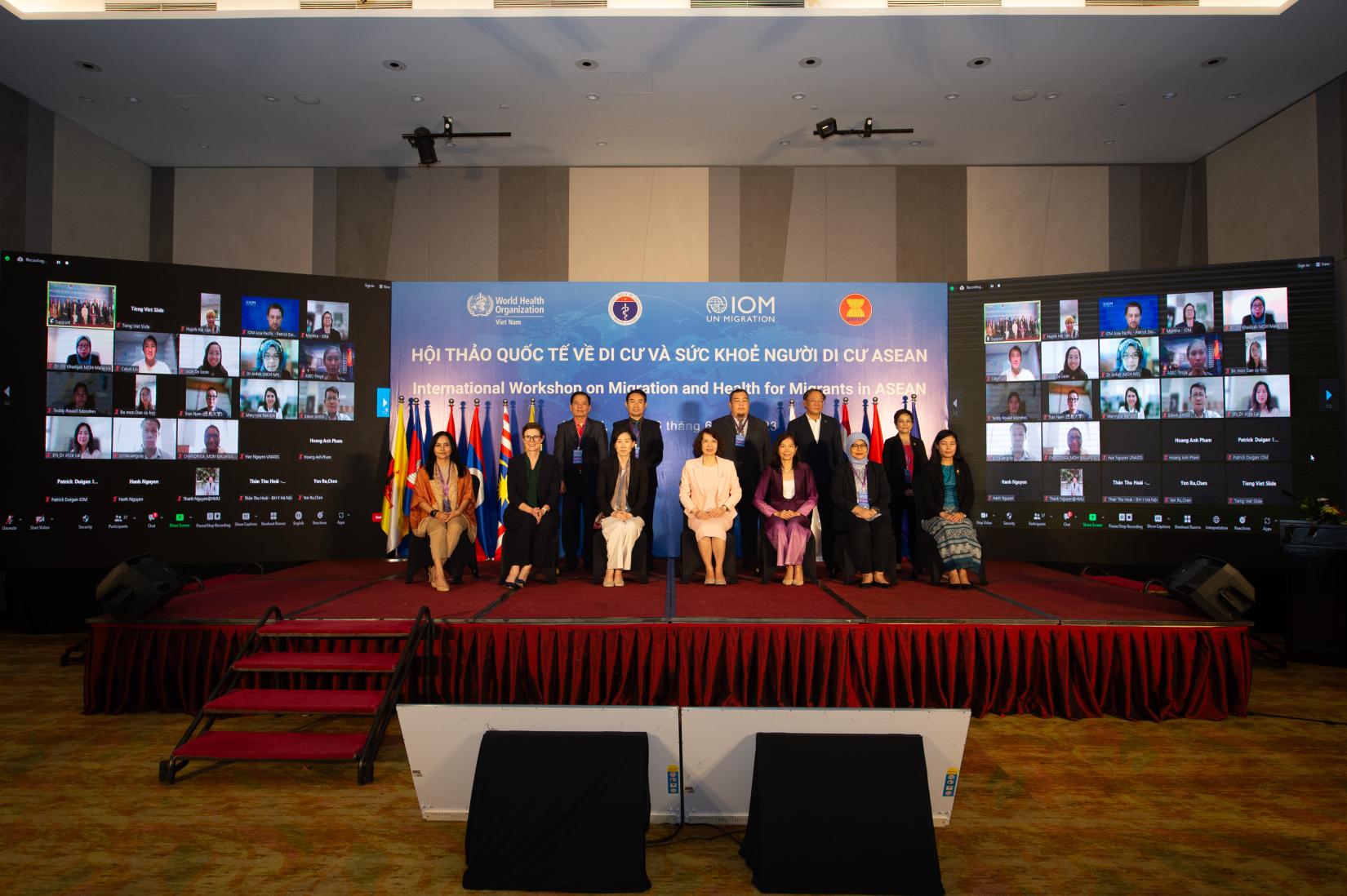IOM and Viet Nam Government advocate for strengthened regional cooperation to improve migrant health and well-being in ASEAN
27 June 2023

HANOI – Over 160 high-ranking officials, experts, and scholars from health sectors and non -health sectors representing The Association of Southeast Asian Nations (ASEAN) gathered in person and online for the international workshop titled "Migration and Health for Migrants in ASEAN." The workshop provided a platform for participants to discuss and strengthen cooperation among the ASEAN Member States to enhance the health and well-being migrants. It also called for streamlined collaboration to improve access to healthcare services for migrants, especially cross-border migrants. The Ministry of Health (MOH) of Viet Nam led the workshop in collaboration with the ASEAN Member States, with the support from the International Organization for Migration (IOM) and the World Health Organization (WHO).
The ASEAN region has long been a significant hub of origin, transit, and destination countries for migrants and their families. Asia accounts for a substantial number of migrants (106 million), with over 60 percent of all international migrants residing in Asia (80 million). The ASEAN region records the highest number of international migrants in Asia, following India and the People’s Republic of China[1]. Over the past three decades, international migration rates within the ASEAN member states have witnessed a significant increase as people of diverse genders, ages, abilities, sexual orientations, and ethnicities migrate due to various push and pull factors.
However, the burden of health issues within ASEAN remains complex, including infectious diseases, occupational health hazards and injuries, mental health challenges, non-communicable diseases (such as cardiovascular disease and diabetes), and maternal and child health problems. Infectious diseases like Human immunodeficiency virus (HIV), Acquired immunodeficiency syndrome (AIDS), tuberculosis (TB), and malaria continue to be significant concerns for member states. Some countries in the region are recorded as the countries with the highest prevalence of TB, HIV, and malaria. The Philippines, Myanmar, Indonesia, Thailand, and Viet Nam are among the top 30 countries with the highest TB incidence globally[2].
Across ASEAN, much heterogeneity exists in health service delivery systems. Health expenditure varies from the highest, in Cambodia to the lowest in Brunei Darussalam. Achieving Universal Health Coverage (UHC) remains a challenging goal, even for the citizens of the Member States, and presents an even greater challenge for migrants. Recent studies conducted by IOM in the region have highlighted the challenges faced by cross-border migrants in accessing healthcare, including language barriers, discrimination, financial constraints, lack of portable health insurance across borders, and lack of official cross-border referral mechanisms for migrant patients. They can be made even more vulnerable in pandemic situations due to inadequate access to needed health care and services, as shown during the COVID-19 pandemic.
H.E. Nguyen Thi Lien Huong, Vice Minister of the Ministry of Health, emphasized the importance of the workshop, stating: “The International Workshop on Migration and Health for migrants in ASEAN is an excellent opportunity for all ASEAN Members to collectively assess the current situation and trends of migration in the region and the world, and its impacts on socio-economic development. We can share lesson learned, initiatives and policy recommendations to promote the health of migrants in ASEAN to strengthen cooperation between ASEAN member states as well as with our partners in migrant health.”
IOM’s Chief of Mission, Ms. Park Mihyung, applauded the collaboration between IOM and the MOH: “In a world where an increasing number of people are on the move, regional collaborations and partnerships are crucial to enhance the health and well-being of migrants. Healthy migrants contribute to healthy communities.”
“I am proud that IOM and ASEAN nations have taken a positive step toward advancing migrant health agenda in accordance with the goals of the Global Compact for Safe, Orderly, and Regular Migration (GCM). GCM is the first inter-governmentally negotiated agreement that prioritizes health as a cross-cutting issue, with references to health and healthcare access in several objectives. By aligning with the GCM with the SDGs and World Health Assembly Resolutions, we have a significant opportunity to promote the health of migrants, foster multi-sectoral partnerships, and develop data-driven policies in ASEAN,” Ms. Park Mihyung added.
Guided by the 2030 Agenda for Sustainable Development particularly Goal 3, which aims to ensure healthy lives and promote well-being for all at all ages, and Resolution 70.15 “Promoting the health of refugees and migrants,” endorsed by the World Health Assembly in May 2017, all member states must ensure that migrants are included in national health systems, ensuring their access to quality healthcare services without barriers.
Migrants’ health is also a top priority of the ASEAN Health Sector under the ASEAN Post 2015 Health Development Agenda, specifically, the ASEAN Health Cluster (AHC 3) on Strengthening Health Systems and Access to Care. The AHC 3’s program aims to enhance health systems’ capacity and capability to seek to improve services for documented migrants, including migrant workers, especially women, and children.
Background information:
IOM and Viet Nam’s achievements in ensuring migrant health:
- In Viet Nam, IOM has implemented various mechanisms to promote migrants' access to healthcare services, such as facilitating TB diagnosis and treatment for migrants across Viet Nam - Cambodia border. With financial support from the Global Fund, IOM is supporting the National Tuberculosis Programmes in both countries to establish a cross-border referral mechanism. This mechanism serves as a digital platform for communication between health facilities in border provinces of Viet Nam and Cambodia, for information exchange and referring TB patient across the border. Despite being piloting, the initiative shows positive outcomes, and the Lao People's Democratic Republic has expressed interest in joining the scheme.
- In response to the Vietnam Government’s call, IOM and WHO have supported the Ministry of Health in establishing an inter-ministerial and inter-sectoral working group, called the Migrant Health Working Group (MHWG) in 2021. This inter-ministerial and inter-sectoral working group, approved by the Minister of Health, serves as a technical coordination mechanism, enabling relevant departments across different ministries to manage migrant health issues and coordinate with relevant stakeholders to foster the design and implementation of migrant-friendly health interventions and policies.
- Since its establishment, IOM has supported the MHWG in implementing various activities to improve the health of migrants, including the launching two informative, easy-to-understand, and easy-to-access health handbooks for Vietnamese migrant workers in the Republic of Korea and Japan. The handbooks have been adopted by the Vietnamese Government and recruitment agencies as part of their pre-departure briefings for migrant workers. IOM will soon launch a third handbook for Vietnamese migrant workers in Taiwan in 2023- 2024.
For further information contact:
IOM Viet Nam:
Nguyen Ngoc Tram, National Communications Officer - Email: ngocnguyen@iom.int ; Mobile: 0912893964
[1] https://asean.org/wp-content/uploads/2022/08/ASEAN-Migration-Outlook-Final.pdf
[2] https://asean.org/wp-content/uploads/2023/03/ASEAN-report_Case-Study-on-Migration-Health_10Apr2023.pdf




